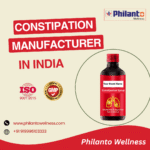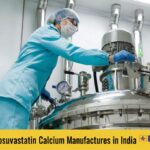These days, many companies in the pharmaceutical and FMCG sectors prefer third party manufacturing because it helps them diversify their products without incurring large infrastructure costs. But before entering into such agreements, it is imperative to consider some critical elements so that the entire process of manufacturing, outsourcing, and logistics will be smooth sailing.
In this blog, we will explore what to look for before taking third party manufacturing and how to make informed decisions that benefit your brand in the long run.
1. Company’s Certifications & Compliance
Select only those manufacturers who possess certifications like:
- ISO -GMP (World Health Organisation – Good Manufacturing Practices)
- GLP (Good Laboratory Practices)
- FSSAI certification for food products and nutraceuticals
These certificates guarantee that the facility has in place proper SOPs for quality and safety control. Relevant licensing, like CDSCO, DCGI, or AYUSH compliance, is also essential, depending on your product category.
2. Manufacturing Capabilities & Infrastructure
Look at the plant from either onsite or online and evaluate:
- Production capacity: Does it meet your demand both now and down the road? Types of dosage forms handled: tablets, capsules, syrups, ointments, etc
- Types of dosage forms handled (Tablets, capsules, syrups, ointments, etc.)
- Machinery and technology used
- R&D and formulation support (if you are launching new products)
- This helps ensure the manufacturer can handle your product portfolio professionally and at scale.
3. Assessment of Packing and Product Quality
Assess product quality and packaging inspection. Evaluate:
- Stability and shelf-life of products
- Pharmaceutical-grade raw materials
- Compliance and user-friendly, attractive, as well as tamper-proof packaging
- Branding and labelling customisation under your name
- Do not lower your product quality standards; it is a direct reflection of your brand in the market.
4. MOQ (Minimum Order Quantity)
Inquire about the Minimum Order Quantity with regard to the manufacturer’s preferences. Some accept low batch quantities to serve small startups, whereas other companies do not cater to this need at all and only take bulk orders.
Ensure the MOQ works for your scale and budget at the moment within your business operations.
5. Terms of Payment and Costs
Understand the complete cost structure, which includes:
- Raw material cost
- Manufacturing cost
- Packaging and printing charges
- Freight or delivery charges
- GST or other applicable taxes
Discuss payment terms clearly; some manufacturers demand a 50% advance
6. Lead Time & Delivery Schedule
Ask the manufacturer:
- What is their usual order-to-dispatch time?
- How are urgent and repeat orders handled?
- Do they provide delivery, or will you have to arrange your transport?
In a competitive market, timely delivery is very important for maintaining your supply chain.
7. Confidentiality & Legal Agreement
Confirm that there is a detailed third party manufacturing agreement that covers:
Work details:
- Specified quality
- Timeliness of delivery
- Protection of intellectual property (IP) Clauses on confidentiality
The document serves to legally bind both parties while protecting them, reducing conflict down the line.
8. Product Range and Customization
Choose manufacturers willing to provide a broad scope of services as well as those who permit custom formulation or private labelling, including:
- Expand offerings gradually,
- Modify ingredients driven by market demand
- sustain distinctiveness in a saturated marketplace
These strategies are focused on helping your business remain competitive and uniquely positioned.
9. Client Feedback & Reputation
Always make sure you:
- Check Google reviews,
- testimonials and client references.
- Request sample products before finalisation.
- Reach out to existing clients (if possible) to understand their experiences.
A manufacturer with a strong performance history ensures greater trust and more dependable partnerships.
10. After-Sales Support & Documentation
Evaluate the support that follows from production processes provided by the company, such as:
- Post batch test reports
- COA (Certificate of Analysis)
- Assistance in product registration or licensing
- Post-production inquiry handling and customer service.
There should be responsiveness for accessible documentation, such as ZO-responsive record keeping, throughout the contractual partnership.
Conclusion
Your choice of a third-party manufacturer could become the turning point for your business’s success or failure. Every detail matters, beginning from their certifications and infrastructure to quality, price, along customer support. A dependable manufacturing partner not only guarantees prompt production but also aids you in establishing a strong and scalable brand in the market.
For those seeking a reliable third party manufacturing partner in India, feel free to reach out to Philanto Wellness, a company that holds WHO-GMP certifications while providing first-class pharma manufacturing services throughout India.
FAQs – What to Know Before Taking Third Party Manufacturing
Is it possible to commence third party manufacturing without holding a drug license?
No, one does not need a valid drug license or need to tie up with someone who has it to manufacture pharmaceutical products.
What is the usual cost associated?
It varies based on product type, size of the batch, packaging, as well as materials — an estimate can only be given after all details are provided.
Is third party manufacturing allowed in India?
Yes, this model is well established and recognised by the lawmakers governing pharmaceuticals in India.
What is the duration of the manufacturing process?
It typically takes 30 to 45 days, depending on the specific product and the quantity ordered







